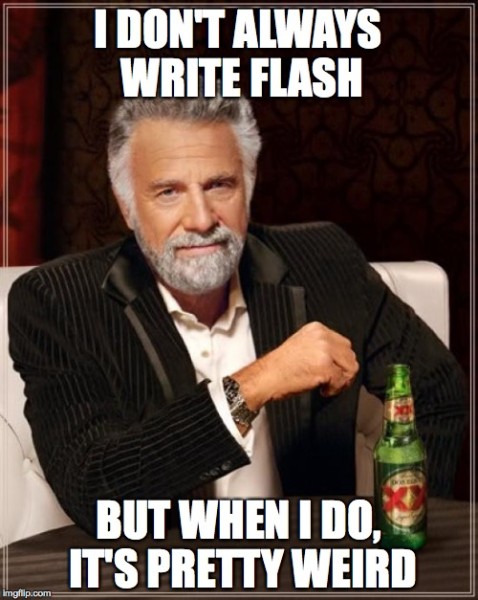
In SmokeLong‘s “Why Flash Fiction?” series, flash fiction writers and editors explore what draws them to the form, from the first time they wrote a piece of flash to why flash resonates with them. In this column, writer Tara Campbell shares why she writes speculative flash. Submit your own “Why Flash Fiction?” article or other flash-related essays on our Submittable page!
By Tara Campbell
Like most writers, I experiment with various lengths and genres. But I have a special fondness for speculative flash: short works containing elements of science fiction or fantasy.
And why speculative flash, you ask?
Because sometimes I wonder how happy the ever-after really is when a woman shacks up with a genie. And who hasn’t ever been afraid that all their magical days are behind them?
Because sometimes I need to figure out the pyramid marketing scheme for a chlorophyll-based diet product. And I’m not a huge fan of the beauty-industrial complex.
Because sometimes I want to know why a mermaid gets exiled from the ocean to a lake—and more importantly, what she plans to do about it. And I’m sick of the gods having all the power.
Because sometimes I just have to let the model shrew brain placed right next to the whale brain in Vitrine A at the zoo’s animal education center speak its…mind. And sometimes I feel really out of place too.
Because beyond the swashbuckling adventures in space, I wonder what it would be like to run an interspecies nursery on a starship. And even if you don’t have kids, we should all support family-friendly workplaces.
Because if earth-based student exchange is already so tricky, how nuts would intergalactic student exchange be? And life on either side of a behavioral contract is no great shakes.
Because how the peanuts became sentient doesn’t matter—what matters is they’ve got your husband!
Okay, I haven’t written that one yet, but how fun would that be?
So why write flash?
Because we experience life in flash.
We live in episodes rather than fully explicated, contextualized, digestible paragraphs.
We take in sights, sounds, smells, tastes, textures.
We think in shorthand and synthesize later.
We usually have no idea which moments in time will be significant until much later. The details themselves don’t tell us what that moment means, yet without them, we cannot effectively recreate the experience.
And why do I write flash?
Because I love to go through the whole process—map out, contextualize, and synthesize an experience—then circle back to the beginning and whistle at a reader to come look at this cool thing I found.
And sometimes I need to focus on style, language, and compression.
And sometimes I just want to get to the meat of the thing.
And why speculative flash?
Because it’s the icebreaker that crashes through the frozen ocean inside my head.
And because serious times require serious dreaming.
And because stories don’t have to be factual, or even possible.
They just have to be real.

Tara Campbell is a Washington, D.C.-based writer. With a BA in English and an MA in German, she has a demonstrated aversion to money and power. Her fiction has appeared in Barrelhouse, Punchnel’s, Toasted Cake Podcast, Luna Station Quarterly, Up Do: Flash Fiction by Women Writers, Master’s Review, Cardinal Sins, and Queen Mob’s Teahouse, among others. Find her online at www.taracampbell.com or on Twitter @TaraCampbellCom.

 The core workshop of SmokeLong Fitness is all in writing, so you can take part from anywhere at anytime. We are excited about creating a supportive, consistent and structured environment for flash writers to work on their craft in a community. We are thrilled and proud to say that our workshop participants have won, placed, or been listed in every major flash competition. Community works.
The core workshop of SmokeLong Fitness is all in writing, so you can take part from anywhere at anytime. We are excited about creating a supportive, consistent and structured environment for flash writers to work on their craft in a community. We are thrilled and proud to say that our workshop participants have won, placed, or been listed in every major flash competition. Community works.